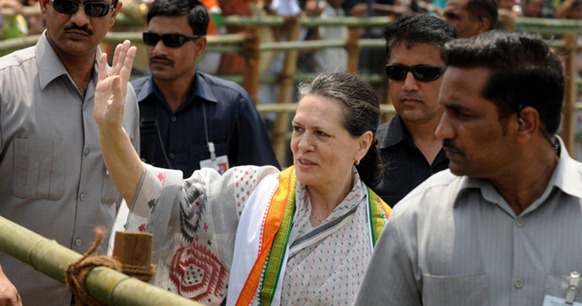 It has been 11 days since the announcement of the disappearance of Sonia Gandhi, the most powerful political figure in India. From all corners of the country, people have offered prayers and good wishes, even her political enemies. Yet what is most intriguing is that so few people are demanding that she be found.
It has been 11 days since the announcement of the disappearance of Sonia Gandhi, the most powerful political figure in India. From all corners of the country, people have offered prayers and good wishes, even her political enemies. Yet what is most intriguing is that so few people are demanding that she be found.
Mrs. Gandhi’s disappearance is voluntary, if startling. For more than a decade she has presided over the Indian National Congress Party, which made the Aug. 4 announcement such a surprise: she had left India for an undisclosed hospital in the United States to have surgery for an undisclosed condition.
Questions begged for answers: Was her life in danger? Where was she? Would this affect the Congress Party-led coalition government? Yet few answers were provided.
Even now, Congress officials have released only the basic facts that Mrs. Gandhi, 64, has undergone “successful” surgery, has been released from intensive care and should return to India in a few weeks.
Rumors that she has cancer, or is being treated in New York, are unconfirmed. Some news outlets have published editorials calling for more disclosure. But in this raucously noisy political culture, Mrs. Gandhi’s health has mostly elicited silence.
“The privacy of the family needs to be respected,” said Sudheendra Kulkarni, an opposition commentator and a critic. “It is not something that people are demanding to know.”
Symbolically, Mrs. Gandhi’s health concerns mirror the weakened state of her party’s coalition government. The current session of Parliament has so far produced only rancor, as opposition parties have shut down proceedings with angry, theatrical protests against corruption. A new national poll found that the government’s credibility has been harmed by several major scandals, while critics and some allies complain of a leadership vacuum.
Even before Mrs. Gandhi’s health problems, speculation had ebbed and flowed about whether Prime Minister Manmohan Singh would be moved aside before the next national elections in 2014. Mr. Singh and Mrs. Gandhi, who both enjoy reputations for rectitude, have dominated Indian politics since the Congress-led United Progressive Alliance government took power in 2004. Recently, though, the effectiveness of their arrangement has seemed to falter.
“It is perhaps the most directionless government the country has had in the last 20 years,” said Yogendra Yadav, a social scientist. “This is their seventh year in power, and people are beginning to see all the instances where the government isn’t delivering where it said it would.”
Complaints are coming from all directions. Business leaders are frustrated over inaction on reforms on labor laws, foreign investment in retail and other issues. Social activists are planning a hunger strike to protest what they consider a watered-down bill to fight corruption. Leftists rail against rising inequality. A bill to create consistent, fair compensation policies when land is acquired for development is considered crucial, yet its passage is uncertain.
The strength of the Singh-Gandhi partnership has been a mutual lack of ego and a division of duties. Mr. Singh, the scholarly economist, has overseen the government and steered foreign policy. Mrs. Gandhi, the shy, Italian-born widow of Rajiv Gandhi, the assassinated former prime minister, has managed the internal politics and election campaigns of the Congress Party.
This role has made Mrs. Gandhi a ubiquitous figure at many party and government events, but otherwise she is largely shielded from public scrutiny. In the past decade, Mrs. Gandhi has almost never granted media interviews. Friends and political allies are loath to talk about her, knowing the family’s intense obsession with privacy. This desire to avoid the spotlight is considered one reason that Mrs. Gandhi, who has twice delivered the Congress Party to national power, did not appoint herself prime minister.
Yet she has been a potent force on policy issues: She regularly meets with visiting heads of state and makes official overseas visits. She is an elected member of the lower house of Parliament. She also heads the National Advisory Council, a quasi-governmental body that writes social policy, a job that gives her a cabinet-level rank. And her influence is such that opposition leaders often belittle Mr. Singh as a junior partner.
(For updates you can share with your friends, follow TNN on Facebook and Twitter )
